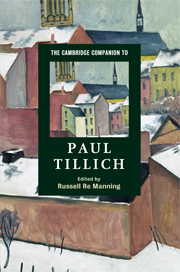Book contents
- Frontmatter
- Part I Standing within the theological circle
- 1 Tillich’s life and works
- 2 Tillich as systematic theologian
- 3 Tillich on God
- 4 Tillich’s Christology
- 5 Tillich’s theology of the concrete spirit
- 6 Faith (and religion)
- 7 ‘First, read my sermons’ Tillich as preacher
- Part II Theology of culture
- Part III Tillich in dialogue
- Bibliography
- Index
5 - Tillich’s theology of the concrete spirit
from Part I - Standing within the theological circle
Published online by Cambridge University Press: 28 May 2009
- Frontmatter
- Part I Standing within the theological circle
- 1 Tillich’s life and works
- 2 Tillich as systematic theologian
- 3 Tillich on God
- 4 Tillich’s Christology
- 5 Tillich’s theology of the concrete spirit
- 6 Faith (and religion)
- 7 ‘First, read my sermons’ Tillich as preacher
- Part II Theology of culture
- Part III Tillich in dialogue
- Bibliography
- Index
Summary
For Paul Tillich, the Holy Spirit is no 'forgotten God' but the reality of 'God present to our spirit', the one who makes the New Being of the Christ alive in life and history (EN, 84). Tillich's theology of Spirit, comprising the largest section of the five-part Systematic Theology, is the constitutive element of his understanding of God and the human person, and completes the Trinitarian structure of his system. The last volume on the Spirit is the least examined and discussed of the Systematic Theology, but it is vital to an interpretation of the whole. Langdon Gilkey, one of his finest interpreters, reminds us that 'Tillich is in truth a theologian of being; but what he means by being is often misunderstood if he is not also seen as a theologian of the Spirit.' This chapter will explore Tillich's idea of the Holy Spirit or what he calls the 'Spiritual Presence' - its correlative relationship to 'life', its place in the Trinity, its relationship to ecclesiology and what Tillich calls theonomy in morality, culture and religion. It will conclude with some reflections on Tillich's pneumatology and his call for the 'Religion of the Concrete Spirit' and a brief application of Tillich's interpretation of Spirit to 'spirituality'. Tillich considered in brief fashion the divine Spirit in the first and second volumes of his Systematic Theology: in volume I, when spirit was described as 'the most embracing, direct, and unrestricted symbol for the divine life', in volume II, when the divine Spirit became the Spirit of Jesus the Christ, constituting him as the Christ and making the power of the New Being effective (ST I, 249; ST II, 156-7). While Tillich also considers the Spirit in a number of his sermons, it is only in the third volume of his system that a full picture of the divine Spirit can be found.
- Type
- Chapter
- Information
- The Cambridge Companion to Paul Tillich , pp. 74 - 90Publisher: Cambridge University PressPrint publication year: 2009



